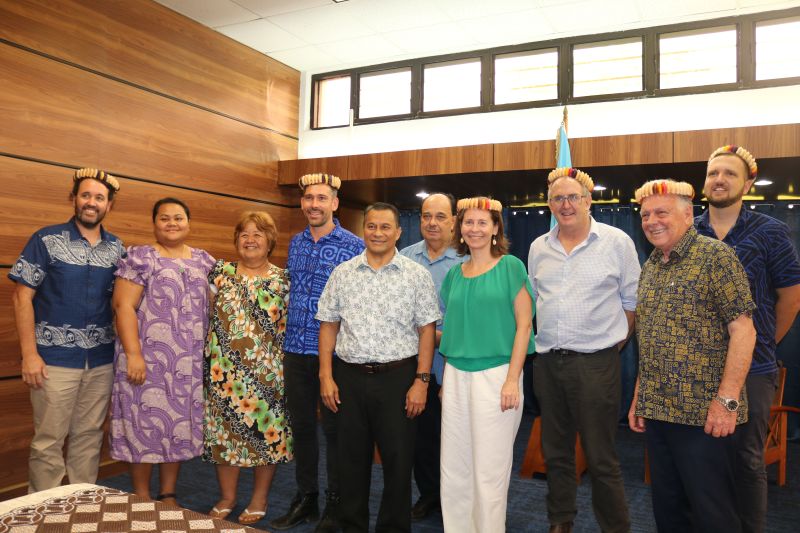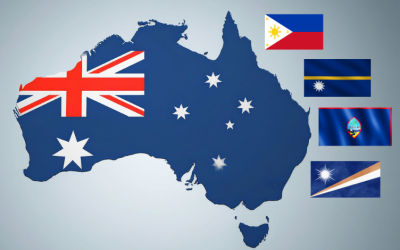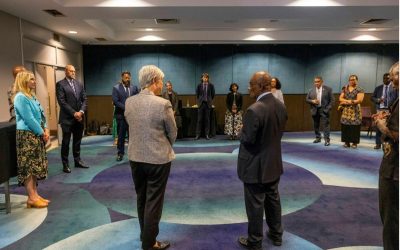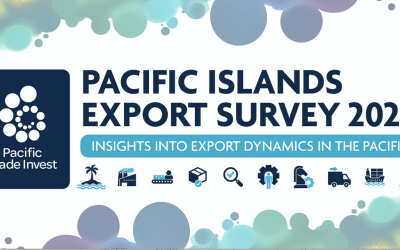A select delegation from the executive committee of the Australia Pacific Islands Business Council (APIBC), led by President Simon Gorman, Managing Director of Reeves Envico Group, embarked on a pivotal visit to the Northern Pacific, from July 11 to July 19. The delegation’s itinerary included stops in Kiribati, Marshall Islands, Federated States of Micronesia (FSM), Guam, and Palau. This mission, although limited in size due to logistical challenges in accommodation and transport, was strategically planned to explore the economic landscapes and labour market capabilities of each country.
Reflecting on the visit, Simon Gorman said, “This delegation represents a significant opportunity for our members to gain a deeper understanding of these unique economies. While we do not anticipate immediate business wins, the knowledge and connections we foster during this trip will be invaluable for future engagements.”
Strategic engagements across the Northern Pacific
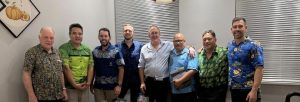
The delegation members meeting with associates in Tarawa, Kiribati.
Throughout their journey, the APIBC delegation engaged in a series of high-level meetings and discussions. These included briefings by resident Australian Ambassadors or High Commissioners, consultations with local Chambers of Commerce and Industry, and strategic interactions with senior government officials and local businesses. William Blank of Hall Contracting, who also serves as the APIBC Vice President, praised the support received during the trip: “Australian High Commissioners and Ambassadors in the North Pacific were great in arranging all our meetings and events, they did a fantastic job.”
Peter Gabriel, Commercial Director of Summitt Trust praised the trip, saying, “[it was] a great trip that showcased just how integral the APIBC is in entering new markets in the Pacific. Frank Yourn and Simon are able to secure meetings with governments, local businesses, and ambassadors which are not readily available. APIBC membership is a must-do first step when working in the Pacific.”
Promising Opportunities and Key Challenges Identified
One of the highlights of the visit was the stop in Pohnpei after visiting Kiribati. Here, the team engaged with the Chamber of Commerce in Pohnpei to explore mutual business opportunities between Australia and FSM. The discussions focused on identifying key sectors for collaboration and investment, aiming to strengthen economic ties between the two regions. At the College of Entrepreneurship in Pohnpei, the delegation discussed fostering educational and business partnerships to develop skills and empower local communities, a crucial step towards stimulating economic growth in FSM.
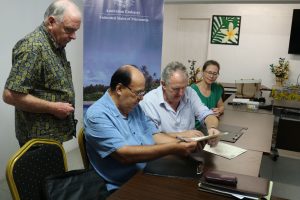
Signing an MoU in FSM.
Gorman expressed his satisfaction with the mission saying, “The opportunity to meet and formally sign memorandums of understanding with the Kiribati, Pohnpei, and Palau Chambers of Commerce and to meet with the Guam Business Community was extremely rewarding and interesting.”
Gabriel also elaborated on the sectors with the highest potential, noting, “I believe that the sectors that have the highest potential are related to climate-resilient infrastructure such as waste management, renewable power generation, and water treatment plants.” He also highlighted some of the challenges that the islands face, including legislative hurdles in Guam and FSM, logistical issues in FSM and Palau, and a lack of available infrastructure in Kiribati.
Australian business presence and potential
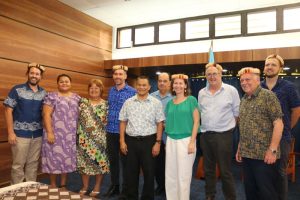
The delegation in FSM.
William Blank observed a promising trend during the visit, noting, “There was a real sense of willingness to do business with Australia, though most of the trade is with the US. Australia is closer, so there is great potential for Australian businesses.” He also mentioned the visibility of Australian products in the region, adding, “There were lots of Australian products on shelves in Guam, including Tim Tams.”
Gorman also touched on broader regional issues, adding, “The opportunities being provided by increased support from Australia and the USA in the region are significant. The need for continued support to the smaller airlines such as Nauru Airlines operating in the region to provide competition to Fiji Airways and United Airways is very important to the sustainability of inter-Pacific business and tourism.”
Luke Jackson, reflecting on the event, said, “The event was great and highly recommended for anyone wanting to get an understanding of the landscape and backdrop of the Northern Pacific.” He also pointed out some notable observations, such as certain countries being risk-averse to loans and preferring grants instead. He remarked on the influence of the US in the region, stating, “Heavily influenced by the US in terms of standards, ways of measuring, lbs vs kgs etc.” Jackson also noted an overwhelming interest in Australian products and services, alongside some confusion regarding the perceived lack of Australian interest.
Future Pathways for Strengthening Pacific Ties
Gorman also commented on migration impacts, noting, “The impact of temporary and permanent migration of working-age individuals to the USA and Australia is having an impact on economies in the region. In particular, in the Northern Pacific countries, this is leading to the opening up of working visas from the Philippines and Bangladesh to enable the large infrastructure initiatives to be carried out.”
The delegation also identified opportunities in food exports, trade, and environmental and climate change projects. The support from Australian government representatives in each country was highly appreciated, with Gorman concluding, “The trip was very worthwhile. Any of our members should be in contact if they are considering working in the region.”
For the future, Peter Gabriel suggested, “What APIBC could do going forward in enhancing relationships… More frequent trips to these islands to enhance the new relationships.”
This mission, though not immediately focused on securing business deals, laid a robust foundation for future collaborations, with the APIBC continuing to play a critical role in fostering economic partnerships between Australia and the Pacific Islands.
